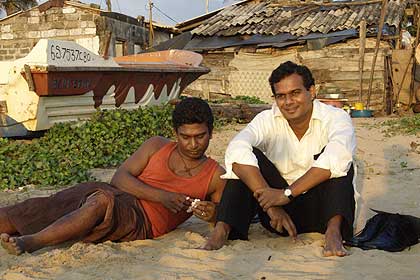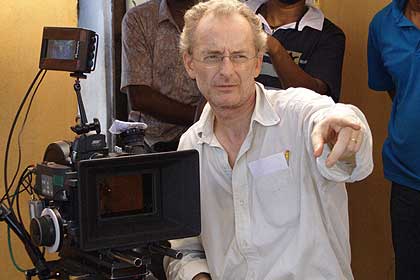theartsdesk in Colombo: Sri Lankan sports wannabes go global | reviews, news & interviews
theartsdesk in Colombo: Sri Lankan sports wannabes go global
theartsdesk in Colombo: Sri Lankan sports wannabes go global
The extraordinary movie about a ruse to win freedom
The Regal Cinema is a charming old place. At 300 rupees for a box seat (£1.50 on a good day for the SLR), you can put your feet up, sip your Fanta in style and, peeping through the plush velour curtains that separate you from both hoi polloi and screen (if not from the nouveaux in box 9), get a disconcertingly exact idea of how the place must have felt when the young Queen Elizabeth II sat in this very seat, shortly after the place was built for her.
There’s a new anthem now, of course, but you still have to stand up. Then you get the trailers for "Coming" movies (no rash promises as to when, precisely); a price-list for the seats you’re already sitting in; the management’s proud reminder that this theatre has been kitted out with Dolby Stereo (no less); the government certificate for the imminent feature (a picture of the actual handwritten document, so’s you can be sure it’s legit) – and then you’re off, to the echoing sounds of latecomers clacking the fold-down seats, businessmen answering their phones, and, if you’re very lucky and there’s a power cut, a chorus of whistles and clicks that would embarrass a Xhosa choir.
I was introduced to the Regal by my mate Rich, a local movie star who sometimes moonlights as a building contractor. He has a part in Machan – "German policeman with the square fat head," he told me – and he’d invited me to the Charity Gala Screening.
From the outset, and notwithstanding the evident lightheartedness of the film, everyone seemed to be having trouble following precisely what was going on. After about 40 minutes a voice came over the PA: "We are sorry to inform viewers that we have been given a copy of the film without subtitles." I hung in till the intermission, then went home, declining, as I departed, the manager’s invitation to claim a refund from the Orphaned Children of Sri Lanka Multiple Sclerosis and Basic Eye-Surgery Trust. Rich sheepishly fixed me up with a review copy, and I watched Machan at home, words and all. It is released in the UK this week.
Stanley, a disenchanted barman at the Galle Face Hotel, lives beyond the railway line with at least two generations of his family (it’s hard to be sure) in a house made of junk timber and plastic sacks. His machan – "mate" – Manoj sells fruit at traffic lights (or doesn’t, more accurately), desperately trying to support two mad aunts, two babies and a pre-teen brother who, when not employed stripping wriggly-tin from debtors’ roofs, is down the bookies, betting on the greyhounds.
 Keen to leave Sri Lanka and seek work in Europe, our machans – and so many others like them – are between a poverty-stricken rock and the loan-sharks. They go to the German embassy, visa applications in hand. They pay in loose change and crumpled small notes. Manoj throws in an orange. Their applications are rejected – and not for the first time.
Keen to leave Sri Lanka and seek work in Europe, our machans – and so many others like them – are between a poverty-stricken rock and the loan-sharks. They go to the German embassy, visa applications in hand. They pay in loose change and crumpled small notes. Manoj throws in an orange. Their applications are rejected – and not for the first time.
After work, drowning their sorrows on the beach (picture right), they find a poster for an international handball tournament in Bavaria, hosted by the Asian-German Sports Exchange Programme. Before they know it ("it" being the rules of handball) they are buying sports shirts, forging documents and reapplying for travel documents under the aegis of the Sri Lankan National Handball Team. But crime is crime and inevitably the forger, Ruan – a people-trafficking crook of the lowest order – decides he’d like in on the deal. So now they are three. Ruan spots an opportunity to kill several paperwork glitches with one rubber stamp and ropes in all the already illegal Indians, Pakistanis and East Africans he’s been fleecing. Now they are 10. It’s like a no-talent version of The Seven Samurai. Then a police sergeant catches them conspiring and they are obliged to confess… Eleven.
 Montages. Arguments. Setbacks (for McKee says it must be so). The possibility of selling a kidney to conjure the plane-fare. In extremis, one of them resorts to sleeping with German women for cash. But, sure enough, eventually, they go. Twenty-three of 'em. What’s more, when they get to Germany, rather than leg it straight out of the airport, they actually compete in the tournament (OK, "compete" is a bit strong; but they take part). And after three games in which, rather predictably, they suffer cricket-score defeats, the Germans get wise, the square-fat-headed policemen kick in the doors and arrest… a pile of dirty SLNHT laundry.
Montages. Arguments. Setbacks (for McKee says it must be so). The possibility of selling a kidney to conjure the plane-fare. In extremis, one of them resorts to sleeping with German women for cash. But, sure enough, eventually, they go. Twenty-three of 'em. What’s more, when they get to Germany, rather than leg it straight out of the airport, they actually compete in the tournament (OK, "compete" is a bit strong; but they take part). And after three games in which, rather predictably, they suffer cricket-score defeats, the Germans get wise, the square-fat-headed policemen kick in the doors and arrest… a pile of dirty SLNHT laundry.
The 23 were never found. And the Sri Lankan National Handball Team continues not to exist.
Machan is directed by first-timer Uberto Pasolini (picture below), better known – in case you’d noticed a little narrative resonance – as the producer of The Full Monty. Like its thematic predecessor, though, this is no witless caper. Often funny, occasionally deeply touching, mature in its dialogue (including a high level of swearing, by local standards) and just about striking a balance between international appeal and parochialism (where’s the line between cliché and clarification?), it is no surprise Machan has picked up awards. Moreover – curiouser and curiouser and always popular with movie-goers – it has the additional merit of being true.
 When Pasolini heard this story (which dates back to 2004) he set about, in collaboration with award-winning Sri Lankan playwright Ruwanthie de Chickera, producing a screenplay that not only told the rollicking real-life tale but used it as a vehicle to question our assumptions about illegal immigration.
When Pasolini heard this story (which dates back to 2004) he set about, in collaboration with award-winning Sri Lankan playwright Ruwanthie de Chickera, producing a screenplay that not only told the rollicking real-life tale but used it as a vehicle to question our assumptions about illegal immigration.
Why, the film-makers ask, can some of us travel the world freely so long as we have $100 for visa fees, when others cannot? Because, some retort, when "I" come "here" I contribute; when "they" come to Europe they earn on the black market, pay no tax, and sponge off the system: the benefits are all one way.
Not so, says Pasolini. The heroes of Machan are not, it is made clear, all simply seeking the good life. Some are just seeking a job – any job (one of the more poignant moments of the film involves the replacement of an old bathroom attendant by an automatic hand-dryer). Some want to emigrate so their wives don’t have to. Others are bullied into it by their families. Only one decides that the price of leaving, emotionally and morally, is too high. What’s weird is that most of their families are happy – proud, even – to see their men-folk head off. "She doesn’t know this is the last time we’ll ever see each other," one confides. The film is full of such torments.
Of course, Machan is the kind of little-man story that playwrights and audiences love: and it’s hard to begrudge the spirit of those 23 guys. By inclination I am all for pissing in the face of joyless bureaucrats (they just had to be German, too, didn’t they?), and from Tooting to Toronto – or wherever the SLNHT are now – machans, we salute you for your sheer bloody cheek.
But border-skipping is still illegal, and unfortunately the emphasis of the film, if only by default, comes out against the cruel and unusual immigration laws of the West rather than against the abysmal and opaque governance of the country being left behind. It also implies that freedom to travel to – and even reside in – a foreign country is some sort of human right, which it’s not, and never has been. In that sense the film is basically wrong – and, as a sometime tax-payer at both ends of this particular equation, I can’t help feeling a little irked. The film-makers’ focus, I would suggest, might have been a little closer to home.
That said – and lest I sound like some rupee-pinching curmudgeon – when I discovered the film was given financial support by Europa Cinemas, had been co-produced by German and Italian companies, and that the copy I was watching was pirated from (wait for it) a German distributor, I laughed plenty. No kidding, it turns out you can’t get a kosher copy here for love nor money, and if you could it’d set you back 700 rupees: almost four times the going rate for a "local" DVD (I’m told).
But enough flippancy. Beneath the comedy, there is, of course, an ocean of real sadness to Machan. The stats that show a vast proportion of SL’s national income coming from remittances, disproportionately from women, detached from their families and working (legally) as cleaners in Emirati airports. One scene showed Manoj’s younger brother handing over his savings – visibly, substantially, less than what Colombo’s white extras are paid for a morning’s filming. The fact that, after Pasolini moved the entire movie to Germany for a fortnight of handball and exterior shots, one of the actors disappeared.
Add comment
more Film
 Fantastic Machine review - photography's story from one camera to 45 billion
Love it or hate it, the photographic image has ensnared us all
Fantastic Machine review - photography's story from one camera to 45 billion
Love it or hate it, the photographic image has ensnared us all
 All You Need Is Death review - a future folk horror classic
Irish folkies seek a cursed ancient song in Paul Duane's impressive fiction debut
All You Need Is Death review - a future folk horror classic
Irish folkies seek a cursed ancient song in Paul Duane's impressive fiction debut
 If Only I Could Hibernate review - kids in grinding poverty in Ulaanbaatar
Mongolian director Zoljargal Purevdash's compelling debut
If Only I Could Hibernate review - kids in grinding poverty in Ulaanbaatar
Mongolian director Zoljargal Purevdash's compelling debut
 The Book of Clarence review - larky jaunt through biblical epic territory
LaKeith Stanfield is impressively watchable as the Messiah's near-neighbour
The Book of Clarence review - larky jaunt through biblical epic territory
LaKeith Stanfield is impressively watchable as the Messiah's near-neighbour
 Blu-ray/DVD: Priscilla
The disc extras smartly contextualise Sofia Coppola's eighth feature
Blu-ray/DVD: Priscilla
The disc extras smartly contextualise Sofia Coppola's eighth feature
 Back to Black review - rock biopic with a loving but soft touch
Marisa Abela evokes the genius of Amy Winehouse, with a few warts minimised
Back to Black review - rock biopic with a loving but soft touch
Marisa Abela evokes the genius of Amy Winehouse, with a few warts minimised
 Civil War review - God help America
A horrifying State of the Union address from Alex Garland
Civil War review - God help America
A horrifying State of the Union address from Alex Garland
 The Teachers' Lounge - teacher-pupil relationships under the microscope
Thoughtful, painful meditation on status, crime, and power
The Teachers' Lounge - teacher-pupil relationships under the microscope
Thoughtful, painful meditation on status, crime, and power
 Blu-ray: Happy End (Šťastný konec)
Technically brilliant black comedy hasn't aged well
Blu-ray: Happy End (Šťastný konec)
Technically brilliant black comedy hasn't aged well
 Evil Does Not Exist review - Ryusuke Hamaguchi's nuanced follow-up to 'Drive My Car'
A parable about the perils of eco-tourism with a violent twist
Evil Does Not Exist review - Ryusuke Hamaguchi's nuanced follow-up to 'Drive My Car'
A parable about the perils of eco-tourism with a violent twist
 Io Capitano review - gripping odyssey from Senegal to Italy
Matteo Garrone's Oscar-nominated drama of two teenage boys pursuing their dream
Io Capitano review - gripping odyssey from Senegal to Italy
Matteo Garrone's Oscar-nominated drama of two teenage boys pursuing their dream
 The Trouble with Jessica review - the London housing market wreaks havoc on a group of friends
Matt Winn directs a glossy cast in a black comedy that verges on farce
The Trouble with Jessica review - the London housing market wreaks havoc on a group of friends
Matt Winn directs a glossy cast in a black comedy that verges on farce

Comments
...
...